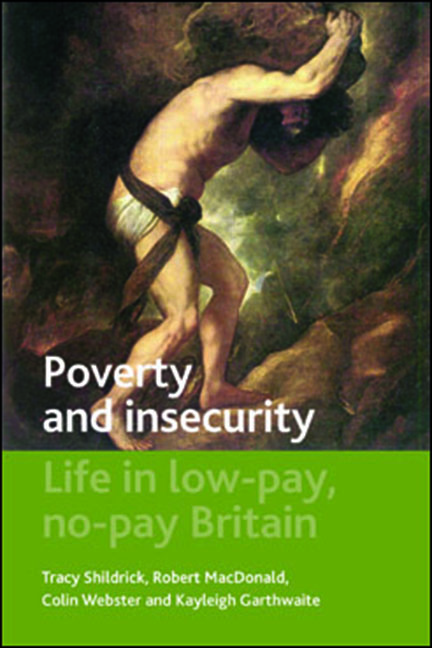Book contents
- Frontmatter
- Contents
- List of figures and boxes
- Acknowledgements
- 1 Introduction
- 2 Poor work, welfare and poverty
- 3 Researching the low-pay, no-pay cycle and recurrent poverty
- 4 The low-pay, no-pay cycle: the perspectives and practices of employers and ‘welfare to work’ agencies
- 5 The low-pay, no-pay cycle: its pattern and people's commitment to work
- 6 Searching for jobs: qualifications, support for the workless and the good and bad of informal social networks
- 7 Poor work: insecurity and churning in deindustrialised labour markets
- 8 ‘The ties that bind’: ill health and caring and their impact on the low-pay, no-pay cycle
- 9 Poverty and social insecurity
- 10 Conclusions
- References
- Index
1 - Introduction
Published online by Cambridge University Press: 07 September 2022
- Frontmatter
- Contents
- List of figures and boxes
- Acknowledgements
- 1 Introduction
- 2 Poor work, welfare and poverty
- 3 Researching the low-pay, no-pay cycle and recurrent poverty
- 4 The low-pay, no-pay cycle: the perspectives and practices of employers and ‘welfare to work’ agencies
- 5 The low-pay, no-pay cycle: its pattern and people's commitment to work
- 6 Searching for jobs: qualifications, support for the workless and the good and bad of informal social networks
- 7 Poor work: insecurity and churning in deindustrialised labour markets
- 8 ‘The ties that bind’: ill health and caring and their impact on the low-pay, no-pay cycle
- 9 Poverty and social insecurity
- 10 Conclusions
- References
- Index
Summary
Work is the best route out of poverty for people who are able to work. (Blair, 1998)
Work, for the vast majority of people, is the best route out of poverty. (Duncan Smith, 2010)
“I struggle, really struggle because by the time I pay my bills, gas, electric and water rates, TV, all that I’m left with a couple of pound that's it … I wanted to work. If I didn't work I think I’d go crazy … I mean, to be honest, somebody in my situation, I would probably be better off on benefits.” (Winnie, 44, employed as a cleaner, Middlesbrough, 2009)
“Just jumping from job to job, it's no way to go. It's a nightmare! Jack of all trades, master of none [laughs]. I just want something with a bit of job security – where maybes I can buy me own house in the future rather than just where you’ve got to be on a wing and a prayer type thing … just a job that I can call me own, you know what I mean? Rather than just looking for one all the time or just jumping from job to job.” (Richard, 30, currently unemployed, Middlesbrough, 2009)
This book is about the lives of individuals and families living in or near poverty – despite (or, as this book will show, because of) their enduring commitment to work and repeated engagement with jobs. We live in a period and in a country where an ‘old libel’ (PSE, 2011) has returned with force, is repeated as fact and is too little challenged: the poor are so because of their own failings – their weakness of morals and character, their fecklessness and idleness, their culture and ways of life. The workless are so because of their preference for ‘benefit dependency’ and their taking of ‘unemployment as a life-style choice’ (Osborne, 2010). As Polly Toynbee pointed out in her book, Hard work in 2003, different, more honest stories about ‘the poor’ are rarely heard (Toynbee, 2003). This is still, possibly even more, true now. ‘The poor’ are largely hidden from public view, relegated to prejudiced depictions of benefit scroungers in tabloid stories and popular television programmes that dwell on the ‘titillating sins of the underclass’ (2003, p 12).
- Type
- Chapter
- Information
- Poverty and InsecurityLife in Low-Pay, No-Pay Britain, pp. 1 - 10Publisher: Bristol University PressPrint publication year: 2012



